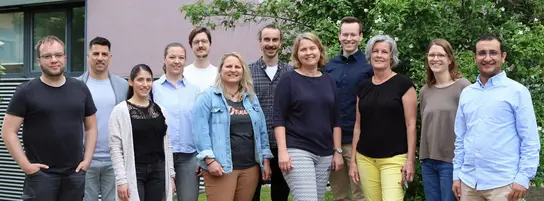Tumor Metabolism and Microenvironment
- Cell and Tumor Biology

Prof. Dr. Almut Schulze
Head of Division
Metabolic reprogramming is an emerging hallmark of cancer. The overall aim of our work is to unravel how oncogenic signalling pathways interact with the metabolic network to drive essential biosynthetic pathways that promote cancer cell expansion. Using RNAseq, metabolic flux analyses, and mouse models, we identify metabolic vulnerabilities and investigate interactions between cancer and immune cells for novel therapeutic approaches.
Image: Detection of ferroptosis in cancer cells @ DKFZ,

Image: Detection of ferroptosis in cancer cells @ DKFZ,
Our Research
Metabolic reprogramming is an emerging hallmark of cancer. Altered metabolic activity in cancer cells drives the production of macromolecules for rapid proliferation and allows cancer cells to survive under conditions of nutrient and oxygen deprivation that is frequently found in tumors. Oncogene activation and loss of tumor suppressor function changes the metabolic activity of cancer cells to drive unrestricted proliferation. Moreover, cancer cells adapt their metabolism to sustain growth and survival when access to oxygen and nutrients is restricted, such as in poorly vascularized tumor areas. Moreover, different metabolic niches require specific adaptations and contribute to the metabolic heterogeneity found in tumors. Metabolic reprogramming in cancer also impacts on regulatory processes, including inflammation, stress resistance and epigenetics. Moreover, metabolic processes also contribute to the heterotypic interactions between cancer cells and the surrounding stroma to facilitate cancer progression and immune evasion.
The overall aim of our work is to unravel how oncogenic signalling pathways interact with the metabolic network to drive essential biosynthetic pathways that promote cancer cell expansion. We use RNAseq to monitor changes in metabolic gene expression and determine the transcriptional networks responsible for metabolic reprogramming in cancer. We also apply metabolomics using high-resolution LC/MS and metabolic flux analysis to determine alterations in metabolic activities of cancer cells and experimental tumour tissues. Moreover, we conduct targeted functional genetic screening to identify metabolic processes that are essential for the survival of cancer cells.
We are investigating different molecular mechanisms controlling the regulation of lipid metabolism in cancer cells. In particular, we are interested in the interactions between altered lipid metabolism and the regulation of cellular growth control and stress response pathways, including ER stress and ferroptosis. Another aspect of our research is the identification of selective metabolic vulnerabilities in cancer cells that could be targeted for cancer therapy. We are particular interested in processes that allow cancer cells to adapt to the metabolic constraints of the tumor microenvironment, such as hypoxia or nutrient deprivation.
Major Areas of Research
Our program covers four major areas of research:
1) Altered lipid metabolism in cancer
2) Identification of selective metabolic vulnerabilities
3) Regulation of ferroptosis at the intersection of lipid metabolism and cell death
4) Metabolic cross-talk within the tumour microenvironment
The laboratory also maintains a high-resolution metabolomics platform for the analysis of polar metabolites and lipids and to conduct metabolic flux analyses using stable-isotope tracing.
Funding of Projects
Selected Publications
Snaebjornsson MT, Poeller P, Komkova D, Röhrig F, Schlicker L, Winkelkotte AM, Chaves-Filho AB, Al-Shami KM, Caballero CD, Koltsaki I, Vogel FCE, Frias-Soler RC, Rudalska R, Schwarz JD, Wolf E, Dauch D, Steuer R, Schulze A.
Buglakova E, Ekelöf M, Schwaiger-Haber M, Schlicker L, Molenaar MR, Shahraz M, Stuart L, Eisenbarth A, Hilsenstein V, Patti GJ, Schulze A, Snaebjornsson MT, Alexandrov T.
Maier CR, Hartmann O, Prieto-Garcia C, Al-Shami KM, Schlicker L, Vogel FCE, Haid S, Klann K, Buck V, Münch C, Schmitz W, Einig E, Krenz B, Calzado MA, Eilers M, Popov N, Rosenfeldt MT, Diefenbacher ME, Schulze A.
Kalogirou C, Linxweiler J, Schmucker P, Snaebjornsson MT, Schmitz W, Wach S, Krebs M, Hartmann E, Puhr M, Müller A, Spahn M, Seitz AK, Frank T, Marouf H, Büchel G, Eckstein M, Kübler H, Eilers M, Saar M, Junker K, Röhrig F, Kneitz B, Rosenfeldt MT, Schulze A.
All Publications
Open Positions
We are always seeking hightly motivated new members for our research Team.
Please reach out to Prof. Dr. Almut Schulze for more information.
Research Group Lipid Pathobiochemistry
Get in touch with us


